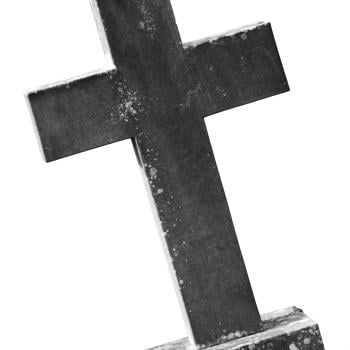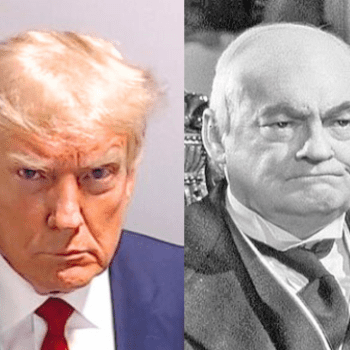Increasingly, evangelical Christians are neither. The term is simply the alias of a group of committed Republicans whose politics have no connection to Christianity. Unfortunately, this marginal minority of the faith community receives a disproportionate portion of media coverage.
They twist their theology beyond anything that Jesus would recognize to justify voting for a thrice-married liar who boastfully breaks more of the 10 Commandments than he can name.
Somehow, they’ve convinced themselves that Democrat Hillary Clinton is a ‘threat’ to Christianity. They want to believe that the Republican who never attends church is a better Christian choice than the Democrat who’s a life-long Christian.
This is the political climate in 2016.
Thankfully, we need not take Clinton’s faith at her word. Her former minister voluntarily offered his testimony.
Hillary Clinton— the Character Question

I thought I was having a heart attack. During a family birthday dinner in September, 1998, I suddenly felt several of the symptoms. “Are you all right?” I was asked. “I’m not sure” I said. A son immediately took charge, calling the rescue squad. Loaded into an ambulance, I was whisked off to a hospital. I was there overnight, with a variety of tests. Happily the tests were mostly negative; it didn’t seem to be a real heart attack after all. Perhaps something I’d eaten. But a ministry colleague at Foundry United Methodist Church reported my hospitalization to the congregation that next morning, during the Sunday worship service.
My bedside phone rang. It was Hillary Rodham Clinton, then First Lady. She expressed genuine concern, hoping that the stress of ministering during the 1998 White House crisis hadn’t caused whatever this was. I thanked her, telling her that I seemed to be all right.
Was this an unusual act of caring on her part? Just because I was Senior Minister of her church? It might seem so. But there had been other occasions, involving other people. For instance during my hospital visit to a church member who was terminally ill, he had received a call of support from Ms. Clinton. Then there was the time at the conclusion of a service when the Clintons were about to leave, and she spotted a woman afflicted with cerebral palsy who was having difficulty being understood. Crossing the narthex she reached out to this woman, whom she could not have known previously, to offer support. Then there was the special Christmas greeting she and her husband sent to an elderly woman in a nursing home, whom they could not have known—a greeting card that remained pinned to the woman’s wall until her death a year or so later. And her reaching out to the parents of a young man who was killed in the Ron Brown plane crash in Croatia.
On a more personal level, she backed her daughter Chelsea’s participation in the youth Appalachia Service Project, which involved very hard work repairing homes of poor people deep in the woods of Appalachia.
Such things help to show why I am deeply troubled by the misguided questions being raised by some about Hillary Clinton’s character, and the relentless attacks that will continue. She is not perfect. None of us are. But she is fundamentally a very good person!
As a lifelong Methodist, she embodies (and often quotes) the teaching of Methodist founder John Wesley that we should do all the good we can, to all the people we can, wherever we can. Wesley advised us all to strive for perfection in love. We should try to be more loving persons. We all fall short of that, but that is the enduring life purpose, in which we are aided and encouraged by God. She also spoke of Wesley’s observation that there is no holiness that is not social holiness, so love also entails social justice and public policy.
Ms. Clinton exemplifies another Methodist principle that may be more reassuring to non-Methodists and, for that matter, non-Christians. We recognize that God is at work among all people everywhere. We must not reject others whose beliefs differ from our own. God’s grace is given to us all. We can warn one another about destructive attitudes and actions, but it is not our place to condemn other persons. Obviously anybody in high office has to make difficult decisions, facing dilemmas and sometimes employing tough actions. She is no stranger to that. But underneath, the guiding principle is how to advance the good–for everybody. She is no stranger to that either. Her tireless efforts in behalf of women and children are well known, reinforced in my mind by personal conversations with her.
I’m puzzled about something else. Ms. Clinton is criticized for, her speaking fees. They’re certainly way above my pay grade! But little is said about her generosity in sharing her economic good fortune with others. She and her husband were among the top givers to the Foundry Church during their White House years. Such giving is without fanfare. Her income tax forms, available on-line for all to see, show that the Clintons give more than 10% (the biblical tithe) of before-tax income to charitable enterprises. The Clinton Foundation, which has received a good deal of her speaking fee income, has done enormous good in Africa and India, probably saving thousands of lives.
I must reiterate that nobody is perfect. In positions of high responsibility any leader will make mistakes. But it matters whether you can learn from experience. And even more, whether your guiding star is to “do all the good you can.”
Dr. Wogaman taught Christian Ethics at Wesley Theological Seminary in Washington, DC where he also served as Academic Dean. Before retirement, he also served as Senior Minister at Foundry United Methodist Church in Washington D.C.
The original Facebook post:
https://www.facebook.com/pianofrank/posts/10210089458222487












